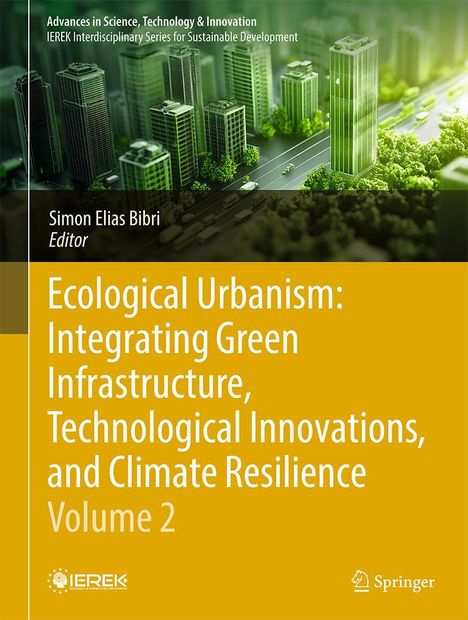Ecological Urbanism: Integrating Green Infrastructure, Technological Innovations, and Climate Resilience - Volume 2, Gebunden
Ecological Urbanism: Integrating Green Infrastructure, Technological Innovations, and Climate Resilience - Volume 2
Sie können den Titel schon jetzt bestellen. Versand an Sie erfolgt gleich nach Verfügbarkeit.
- Herausgeber:
- Simon Elias Bibri
- Verlag:
- Springer-Verlag GmbH, 04/2026
- Einband:
- Gebunden
- Sprache:
- Englisch
- ISBN-13:
- 9783032015273
- Artikelnummer:
- 12342739
- Umfang:
- 490 Seiten
- Sonstiges:
- X, 490 p. 103 illus., 91 illus. in color.
- Erscheinungstermin:
- 26.4.2026
- Serie:
- Advances in Science, Technology & Innovation
- Hinweis
-
Achtung: Artikel ist nicht in deutscher Sprache!
Klappentext
This book provides a comprehensive exploration of green infrastructure, technological innovations, and climate adaptation strategies, offering diverse global perspectives and case studies. This book highlights the role of green infrastructure in strengthening urban resilience and fostering sustainable communities. Topics include living walls and green roofs, biophilic design, and urban forests, demonstrating how ecological planning can enhance both environmental quality and public well-being. Additionally, it studies user behavior in urban public spaces, governance frameworks for green urban policies, and the adaptive reuse of heritage buildings for circularity. Also, this book focuses on nature-based solutions for climate adaptation, circular economy applications in urban spaces, and the role of biodiversity in sustainable regeneration. Key discussions include urban cooling strategies through vegetation, low-carbon agriculture policies, and new perspectives in environmental design. These chapters present forward-thinking approaches for creating climate-responsive and resource-efficient cities. With rapid technological advancements, cities must integrate innovative energy solutions to reduce environmental impact. This book explores air pollution mitigation through urban trees, hybrid micro-energy systems, and solar energy adaptability in transit hubs. It also examines energy-efficient retrofitting in extreme climates and introduces life cycle assessment (LCA) methodologies to improve sustainability in urban planning.
Mehr von Advances in Sci...
-
Towards Sustainable Urban Regeneration: Utilizing Environmental, Cultural, and Social AssetsBuchAktueller Preis: EUR 273,80
-
Hybrid SocietiesBuchAktueller Preis: EUR 54,75
-
Sustainable Landscapes Across the Mediterranean (CrossMED 2024-V1)BuchAktueller Preis: EUR 273,80
-
The Conservation and Sustainable Development of Architectural and Urban HeritageBuchAktueller Preis: EUR 273,80






